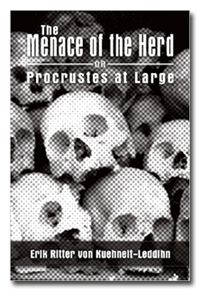Nine Days with Kuehnelt-Leddihn

The Herdist and the Romantic
“Only the select can be closely confronted with the Absolute without taking flight. Only the saints, but not the 'commonsensical' herd, can and will surrender to the 'Holy Folly of the Cross.' For this reason we have such hatred on the part of the mediocre man, who hates any sort of hierarchy, whether of the saints or of sanctity itself. Sanctity is not only an extraordinary condition but also an adventure. And adventure belongs to the domain of the 'Romantic.'”
Great stuff, that.
Unfortunately, one can only thoroughly enjoy it if he is firmly convinced that he is not the mediocre man. Unless you clearly have the holy or intellectual or virtue mojo, it would seem a bit arrogant to hold such a conviction. Indeed, the mere fact that you hold it would indicate that you are the mediocre man. It's almost like you're on a circle of mediocrity.
Of course, one can transcend the mediocrity (which, incidentally, might also be called “lukewarmness”) by loving the saints and their sanctity, by accepting nature's hierarchy and one's place within it, by loving the romantic more than what KL refers to as the “herd instinct.”
If you want to develop your romantic over your herd instincts, KL offers a handy list of corresponding characteristics for each. For instance, “security and safety” are herdist, while adventure is its romantic counterpart. The part of the list I liked the most, though, came at the end:
The Herd Instinct (The Romantic Sentiment)
Feeling of the finite, fear of death (Sense of immortality), which leads to:
Exaggerated worship of health (Indifference to health)
The hectic life (The contemplative life)
Doctor worship (Worship of saints)
Speed (Slowness, procrastination)
Cowardice (Courage)
Cautiousness (Carelessness)
Escapism (Facing of issues)
The opposing traits in that list makes me nervous . . . makes me think about myself, my shortcomings . . . my lack of the sense of immortality.
All this, incidentally, comes in a book of political philosophy. Kuehnelt-Leddhin is a political philosopher with a sure-eye on God. I'm not sure we've had one of those since Thomas . . . not counting, of course, the popes. A true rarity in the modern world.
